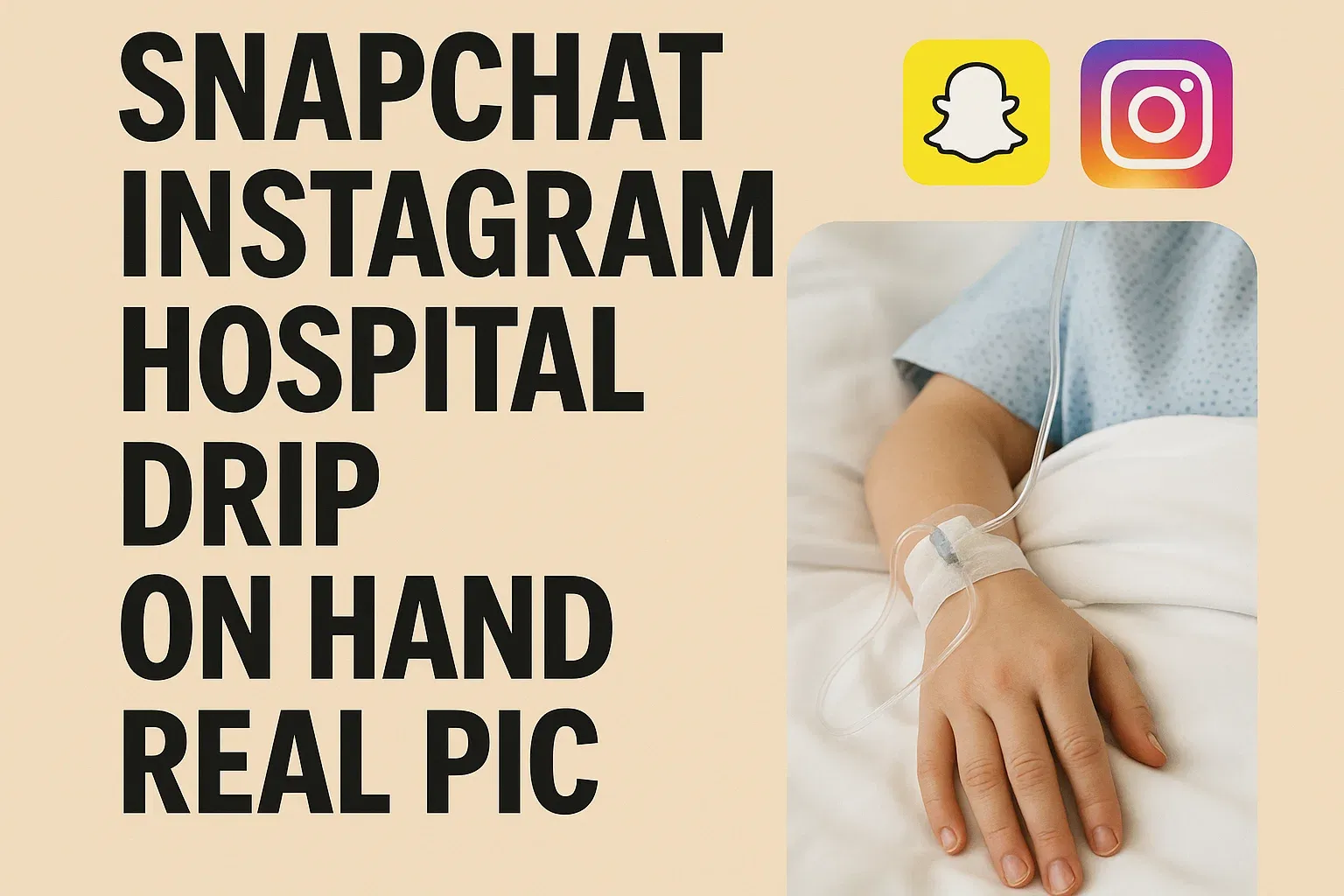In a world where social media is a reflection of our daily lives, one unique and unexpected trend has emerged — the Snapchat Instagram hospital drip on hand real pic. Whether you’re casually scrolling through your feed or tapping through stories, you’ve likely come across these raw, emotional, and sometimes surprising photos.
This trend involves people sharing real images from hospital settings, often featuring a medical drip attached to their hand, along with a hospital gown or wristband in sight. These posts are usually shared in real time on Snapchat or uploaded as Instagram Stories or posts. While this may seem unusual to some, there’s actually a deeper meaning and cultural shift behind this growing phenomenon.
In this article, we’ll explore the reasons behind this trend, what it represents, how it’s affecting social media culture, and why users choose to post such personal moments online.
What Is a “Hospital Drip on Hand Real Pic”?
At its core, the Snapchat Instagram hospital drip on hand real pic is exactly what it sounds like: a real photo showing a person’s hand with a hospital IV drip, often taken while lying in a hospital bed or during treatment. These images tend to highlight the raw, unfiltered side of life — contrasting the usual polished and curated posts on social platforms.
These pictures are commonly taken using smartphone cameras, usually as selfies or quick snaps. They show the vulnerability of being in a medical setting, often during moments of illness, recovery, or emotional breakdowns. Over time, they’ve become a symbol of honesty and openness in the digital space.
Read More : how to remove someone from snapchat
Why Are People Posting These Pics?
1. To Document Their Health Journey
One of the primary reasons people share these images is to document their experience with illness, surgery, mental health recovery, or burnout. Whether it’s a chronic condition or an unexpected emergency, the Snapchat Instagram hospital drip on hand real pic acts as a timestamp — a way to mark a critical point in someone’s journey.
2. For Emotional Support
Social media is often used to reach out for comfort and encouragement. A post like this might prompt friends, family, or followers to respond with kind words, prayers, or messages of support. For someone in a vulnerable state, these messages can be a lifeline.
3. To Raise Awareness
Many users take this opportunity to bring attention to specific health conditions. They might use their drip photo to talk about chronic illness, mental health, post-surgery care, or even lesser-known medical issues. A single post can raise awareness and connect with others going through the same struggles.
4. To Normalize Medical Realities
By sharing hospital moments, users help remove the stigma around being sick or needing help. They break the illusion that life is always perfect, reminding others that health issues can affect anyone.
Snapchat vs. Instagram: Which Platform Is Driving the Trend?
Both Snapchat and Instagram are fueling this visual trend, but they do so in different ways.
-
Snapchat is more spontaneous and private. Users often share a drip on hand pic directly with their close friends. It feels immediate and raw, with minimal editing or captioning.
-
Instagram, on the other hand, allows for more polished storytelling. A person might upload a hospital image with thoughtful captions, hashtags like #healing or #mentalhealthawareness, and sometimes even add filters or effects to soften the emotional impact.
No matter the platform, the Snapchat Instagram hospital drip on hand real pic continues to pop up, signaling a shift in how people are using social media to share their personal health experiences.
Are These Posts Always Genuine?
This is where the discussion becomes a bit complex. While most people share these photos for sincere reasons — support, awareness, authenticity — there’s also a growing concern about performative posting.
Sometimes, users may feel pressure to post every significant life event, including those that should remain private. Critics argue that, in some cases, people might share a real hospital drip pic more for attention than support. Still, it’s important not to assume motive. Everyone handles their experiences differently, and for many, sharing is part of processing.
The Mental and Emotional Impact
For the Person Posting:
-
Therapeutic Expression: Sharing a drip pic can feel like a form of release, especially during difficult times.
-
Control Over the Narrative: By choosing to post, the person takes control of their story instead of letting others speculate.
-
Regret or Vulnerability Hangover: Some users may later feel exposed or judged after sharing such an intimate image.
For the Viewers:
-
Empathy and Support: Followers often respond with kindness and encouragement.
-
Emotional Shock: Especially if the post is unexpected, it can catch viewers off guard.
-
Normalizing Sickness: It can help others feel less alone in their own health challenges.
Real Life Meets Digital Storytelling
In a digital world that’s often filtered and idealized, the Snapchat Instagram hospital drip on hand real pic stands out. It reminds us that behind every social media account is a real human being — with ups and downs, health scares, and recovery journeys.
For example, during the COVID-19 pandemic, many people shared images of themselves receiving oxygen, IV drips, or recovering in quarantine. These posts were raw but also informative, spreading awareness and encouraging health consciousness.
Read More : snapchat planet chart
Ethical and Privacy Considerations
Before you decide to share your own hospital drip on hand real pic, it’s worth thinking about a few things:
-
Are you physically and emotionally stable enough to post right now?
-
Is the photo respectful of others’ privacy?
-
Are you posting for support, awareness, or pressure to keep up appearances?
-
Have you thought about how this might impact your mental health later?
Social media is a powerful tool, but it’s also permanent in many ways. Think through your reasons before you post, and never feel obligated to share something you’re not comfortable with.
When and Why Not to Post
Sometimes, it’s better to keep things private. Here are a few situations where posting might not be the best idea:
-
You’re under medication or emotionally unstable.
-
You’re unsure about hospital rules or patient confidentiality.
-
You’re feeling social pressure rather than personal motivation.
-
You’re posting out of frustration or as a cry for help without thinking it through.
Taking a photo for your own record is fine — but sharing it online is a separate choice that deserves careful thought.
Conclusion
The Snapchat Instagram hospital drip on hand real pic trend is a fascinating reflection of our times. It shows how people are blending personal health experiences with digital storytelling, using platforms not just for entertainment, but also for healing and connection.
Whether you’re someone who’s posted such a photo or just seen others doing it, the key takeaway is this: social media is evolving. It’s becoming a place where even the toughest moments can find light, support, and solidarity.
Your health journey is personal. How you choose to document it — or whether you do at all — is entirely up to you. Just remember, being real is always more powerful than being perfect.
Read More : snapchat best friends list planets
FAQs
1. Why do people share their hospital drip pics on social media?
People share these images to document health challenges, seek support, raise awareness, or express emotional authenticity. It’s a way to connect and be seen during a vulnerable time.
2. Is it okay to post a Snapchat Instagram hospital drip on hand real pic?
Yes, as long as it’s respectful, you’re comfortable sharing, and it doesn’t violate hospital privacy rules. Your intent matters — whether it’s seeking support or sharing your journey.
3. What should I consider before posting my hospital pic?
Think about your emotional readiness, the privacy of others, potential long-term effects, and your personal reasons for posting. If you’re unsure, wait and reflect before sharing.
Read Also –

